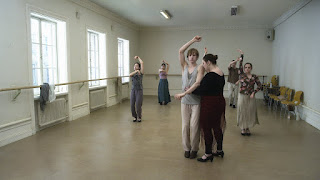Unusual parents, highly protective and unemployed, chose to strictly enforce that their seven children remain inside their apartment, rarely leaving, for the children's entire lives. This documentary catches the children at their crossroads, where some have chosen to take first steps toward re-integrating with people, nature: the outside world, a world only watched until now through their apartment windows and vicariously imagined through the thousands of movies they've viewed. -dp
From: http://www.filmlinc.com/films/on-sale/the-wolfpack
THE WOLFPACKCRYSTAL MOSELLE, 2015USA | FORMAT: DCP | 89 MINUTES
First-time feature filmmaker Crystal Moselle trains her camera on an utterly unique subject in this documentary that seems destined to join the ranks of Grey Gardens and Poto and Cabengo as a portrait of fascinating figures dwelling in society’s margins—or, in this case, a housing project on Manhattan’s Lower East Side. The Angulos are a family with seven long-haired children—six boys and one girl, ages 16-24—whose names are culled from ancient Sanskrit and who have been homeschooled by their mother and forbidden from leaving their apartment by their withdrawn Hare Krishna father.
However, no restrictions have been placed on the children’s movie-watching diets, and the six brothers have not only grown to become die-hard cinephiles, they also collaborate on elaborate, meticulously staged remakes of their favorite films. Their love for movies signals a long-suppressed desire to engage with the outside world—but how do you reconnect with society when the inside of your apartment and your vast DVD collection is all you’ve ever known?
Moselle enjoys a tremendous degree of access to the Angulo brothers, who have managed to become sensitive, passionate, and surprisingly self-conscious people eager to bridge the gap between the world they’ve invented for themselves and the great outdoors. A Magnolia Pictures release.









 Director Andreas Dalsgaard
Director Andreas Dalsgaard








